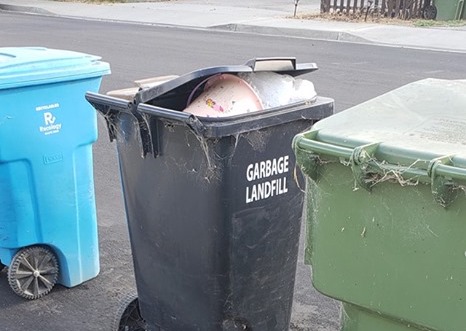Santa Clara Councilmember Raj Chahal continues to oppose the Council’s December 2019 decision to hire Green Waste Recovery (GWR) at an annual cost of $2.4 million to separate food scraps from the City’s trash — mixed waste — rather than separating food scraps at their source — separate or split bins. And he’s taking his argument to residents in an open letter Chahal sent to his mailing list two weeks ago.
Today, the Council is set to finalize garbage rate increases ranging from 68 percent to 28 percent, as a result of the GWR contract.
The action was continued from the June 23 meeting after Chahal, who voted against the contract in January, questioned why the Council had decided to proceed with the most expensive alternative for residents. The mixed waste alternative is cheaper for Santa Clara businesses and multi-family buildings. City staff was asked to review Chahal’s cost analysis and present a report this week.
By Chahal’s analysis, presented to the Council at its June 23 meeting, the rate increase would be less than 5 percent if food scraps were separated at the source. [2020 Residential garbage Rate Hike Analysis-chahal]
“People are already suffering right now,” said Chahal. “The $2 million [for GWR] is coming out of their pockets because of four people’s decisions. What’s the message to residents?”
Debating Alternatives For Meeting a State Mandate
The disagreement has its roots in California’s mandate that municipalities divert organic waste from landfills by 2022. The two alternatives for doing this are either diverting it at the source or hiring companies like GWR to sort the garbage. Sunnyvale and Palo Alto, for example, separate organics at the source; Sunnyvale uses a split bin while Palo Alto uses a separate bin.
Chahal says he’s advocating for the separation of organic waste at the source, not advocating for any specific way of doing it.
Santa Clara had a split bin pilot in 2017 and conducted two surveys about the program. Both reported that a majority (52 and 58 percent) of participants surveyed about that program reported they were somewhat or completely satisfied with the program. The main complaint was reduced bin space for trash.
That, Chahal says, is a fixable problem. “The bins were redesigned into a full-size 20-gallon bin with an organic pocket. I’m arguing for an option to give residents.”
Despite the survey results, the Council majority regarded the split bin program as a failure. In December 2019, they chose the mixed waste alternative; appropriating another $2.4 million for the GWR contract.
“There was a lot of outcry about [the pilot],” Councilmember Kathy Watanabe said at the June 23 meeting.
“People just did not like the split part. I drove around …these neighborhoods, the pilot program, to see how they were being utilized. And it was horrible…. as a matter of fact, in 2018 Councilmember Hardy’s … campaign was against the split cart. … anyway …my feeling was, ‘Why am I going to let the City of Santa Clara invest in a program that nobody is going to use?’”
Council Unreceptive to Reconsideration
Chahal’s effort to open reconsideration of the contract was slammed at the June meeting.
After saying that discussing the contract was a potential Brown Act violation — approving the rate increases was the agenda item, not the contract — City Attorney Brian Doyle proceeded to do exactly what he said they shouldn’t be doing.
“I just don’t think the idea of taking a huge chunk of Green Waste’s contract out of the contract is something worth looking at this point as a cost-saving measure,” Doyle said, “because I think there still could be a lot of other costs in changing horses midstream.”
“There is so much that’s been thrown out tonight unverified,” said Mayor Lisa Gillmor.
“I don’t know where it came from, but it’s completely different from the opinion of … our professional staff…Maybe some Councilmembers just need to go back and refresh their memories about these things…We need to do some very elementary education on what it means when his City signed the contract,” she said.
“We have professional staff, there are not any of us on the City Council that … has the experience to do what our professional staff do,” Gillmor added. Chahal is the founder and CEO of a company that makes specialized microprocessors for movie theaters.
Saying the discussion was “so frustrating,” Councilmember Debi Davis said, “Whether the numbers that were presented tonight are right or wrong, the staff did their due diligence… it was a 4-3 vote …It’s called democracy, people, wake up.”
After hours of discussion, the Council asked staff to provide a report on Chahal’s analysis for the July 14 meeting.
The staff’s report says that Chahal failed to include about $500,000 in costs of the split bin program. [2020 Analysis of CM Chahal’s Presentation] These include:
- $93,000 in theoretical costs for Mission Trail Waste to handle the food scraps in addition to other collection costs
- $150,000 in estimated program costs for outreach, education, customer service and enforcement
- $641,000 in landfill disposal costs that would be incurred because separating organic waste at the source has a lower recovery rate.
Chahal’s numbers came from Council meeting presentations last September and December.
“Even if we accept the staff numbers, residents are losing $1.9 million each year,” he said. “That is more than $28 million in 15 years. The staff added some outreach/education expenses and also the landfill charges changed, which I accepted at the last meeting.”








Whether it’s a majority of citizens voting to keep 6-district voting and dropping the CVRA lawsuit appeal, or in this case to have a split-bin for organic waste, the council seems to find ways to do the opposite. I think it’s the mayor, Watanabe and Davis who should learn what democracy is.